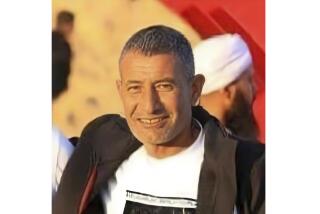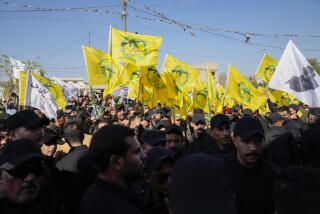Syrian Sunnis and Shiites caught up in kidnapping tit-for-tat
IDLIB, Syria — In a rickety office building once used by agricultural engineers in the village of Hazano, rebels with the Missiles of Justice militia waited to hear word of negotiations about a hostage swap that night.
Sitting at an old metal desk, a Sunni Muslim rebel named Mustafa manned a phone, waiting for new reports of kidnappings. He had started a list of missing Sunnis in a notebook, including a young man in a white Mazda and a pharmacist.
The list didn’t include the names of the Shiite Muslim hostages the rebels were holding in a building somewhere in the village.
Civilians have gotten caught up in a chilling kidnapping racket in Syria’s northwestern Idlib province. As the uprising against President Bashar Assad becomes increasingly sectarian, Sunnis and Shiites here are rushing to collect hostages as bargaining chips.
Sunnis blame Shiites for supporting the brutal Shiite-allied regime, and Shiites fear what could happen to them if the uprising succeeds. The killings and distrust have shattered decades of peaceful coexistence, raising the specter of the type of sectarian war in neighboring Iraq that has long terrified many Syrians.
Days before, a Shiite shepherd from the nearby village of Fuaa had been kidnapped, along with his flock. (Those hearing the news all asked the same question, as dark humor takes hold here: Were the sheep Shiite or Sunni?)
“When the shepherd was taken, he wasn’t taken because he did anything wrong; he was taken as a matter of numbers because of the people they had from us,” Mustafa said. “This isn’t in our nature, but we were forced to do it to gather a number that we can negotiate with.”
The cycle of tit-for-tat sectarian kidnappings has taken root as the uprising enters its second year.
In recent days, there appears to have been a respite in the abductions, as the country is gripped by a shaky cease-fire violated daily. But previous lulls haven’t lasted.
The regime’s intensified offensive in the days leading up to the cease-fire only heightened the animosity. Even if the peace plan ends the crackdown and ushers in political dialogue, the sectarian tension is likely to remain.
Sunni rebels in Idlib don’t acknowledge their role in the tension, saying they occupy the moral high ground in the battle against Assad, a member of the Alawite sect, a small offshoot of Shiite Islam.
“In every conflict there are two sides, and on both there is right and wrong, but on our side there is more right,” said Abu Mohammad, whose home in Atarib, a village in the Aleppo suburbs under bombardment for more than a month, had just been burned by soldiers. “Anybody who is in Bashar’s ranks or supports Bashar is in the wrong and we are going to fight him.”
*
They called him the “ambassador of Fuaa,” but that didn’t save him from being kidnapped by residents from the Shiite village last month.
Abdulaziz, a 35-year-old Sunni civil engineer, had friends and colleagues in Fuaa, and two months ago when kidnappings began in the area, he became an intermediary, helping to negotiate releases and trades.
A few weeks ago, he was driving from his Sunni village, Binnish, to another town for work. He traveled along a dirt road through a farm field, a commonly used detour now that the main roads and highways have become fraught with checkpoints and the risk of kidnapping, shootings and shelling from nearby tanks.
He didn’t realize he had driven upon a hidden checkpoint until he heard the first gunshot and a bullet struck his pickup truck. He slammed on the brakes.
Suddenly 10 armed men descended on the truck and pulled him out. He was blindfolded and taken to their village, even though a few of the young men recognized him.
“They said, ‘You have helped us a lot but we have no choice; we have to take you,’” Abdulaziz recounted the morning after his release as well-wishers came by to welcome him home and laugh at the irony.
He was held for a day before being released with more than a dozen other Sunni hostages in exchange for about 30 Shiites held by rebels.
Months into the uprising, relations between villages in Idlib — a majority Sunni province — and the Shiite villages of Fuaa and Kafari remained friendly and civil, as they had for decades.
But in November, as the uprising increasingly became armed and rebels became more organized, members of local rebel militias began kidnapping and sometimes killing suspected shabiha, or security force members, many of them Shiite.
Many residents of Fuaa, a village of about 20,000, work in the security branches of government.
Months ago, Abu Adeeb, a rebel from Binnish, just a couple of miles from Fuaa, typed up a list and distributed it to all the rebel checkpoints in the area. On it were 52 names of suspected local shabiha, descriptions of their vehicles and the positions they held.
At least seven have been killed, or “sent to Cyprus” in rebel lingo; one man who was shot in the back survived.
“There was a shabiha member from their village and our men took him; we don’t view it as they are Shiite or from Fuaa or whatever,” said Sheik Issam, a religious leader from Hazano. “We view it as this person is a shabiha who is attacking the people.”
But two months ago, as kidnapping or killing of Fuaa residents continued, some members of the community erected their own checkpoints on the highway that runs alongside the town and began snatching rebel fighters.
“They are the ones who are bringing the problems on themselves; you know how they have small minds,” Abu Adeeb said of the Shiites. “I mean, they are the minority sitting among the majority; why would you do that?”
Sunnis blame Assad for igniting and fanning the sectarian strife.
“If Bashar wants to create a sectarian war, we have no problem,” said Anas Abdulkarim, a soldier who defected and a leader of the Missiles of Justice militia. “We have no problem because he will end up being the loser.”
Last month, Human Rights Watch released a letter to the opposition accusing it of kidnapping, detaining and torturing shabiha as well as government supporters. The report included accounts indicating that some of the attacks were motivated by anti-Shiite or anti-Alawite sentiments.
Abdulaziz, the Binnish resident who was kidnapped, said he had spoken to friends in Fuaa who were supportive of the uprising despite warnings by the regime and community leaders that Salafis — ultraconservative Muslims — will come to power and kill all Shiites if the rebels are successful.
“The friends I have there, they remain friends,” he said.
Unlike many in the opposition movement who now view Shiites and Alawites as heretics out to kill them, Abdulaziz doesn’t believe the rhetoric. He understands that the Shiites, like the Sunnis, are afraid.
Abu Hussein, a Fuaa resident who came to Binnish after his family was threatened by local shabiha who consider him sympathetic to the opposition, said security forces and town elders were fomenting the fear of Sunnis among the Shiite residents.
“The society just gets more scared and they are going to take us to discord and a civil war,” he said. “The people are operating on rumors … and the people are getting more scared and buying weapons.”
*
In late March, when asked whether the rebels would continue kidnapping from the Shiite villages, Sheik Issam nodded.
“They will have to, and this is not a sectarian issue,” he said. “What is important to us is for our people to come back safely.”
That morning, residents in the town of Maarat Misreen had found a body bearing signs of severe torture; it turned out to be that of a security force member from Fuaa. The body was returned to the family, but those who killed him remained unknown.
On the same day, a 70-year-old Shiite doctor who had been kidnapped days earlier was released in exchange for a ransom of more than $15,000.
A few days later, most of the hostages on both sides, along with Abdulaziz, were exchanged and the leaders struck a truce. As had happened numerous times before, the roads opened up and people felt safe driving on the highways again.
Not long after, both sides put up checkpoints and the kidnappings began once more.
More to Read
Sign up for Essential California
The most important California stories and recommendations in your inbox every morning.
You may occasionally receive promotional content from the Los Angeles Times.









